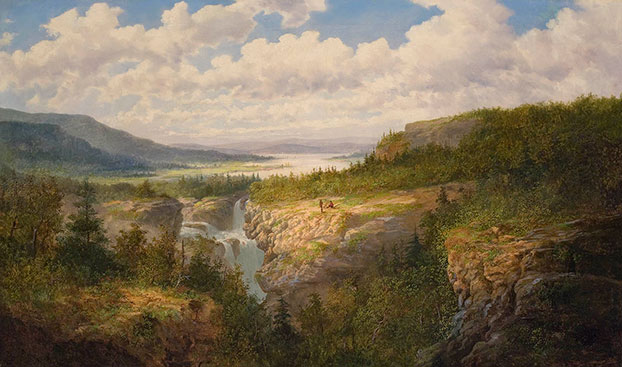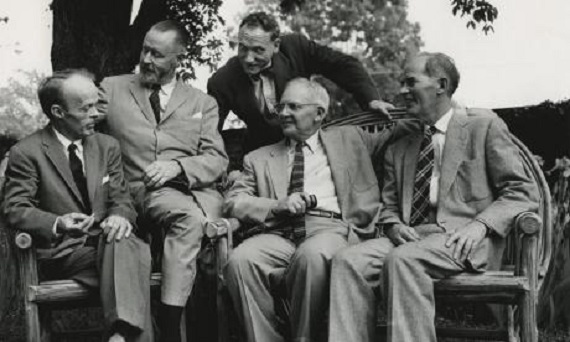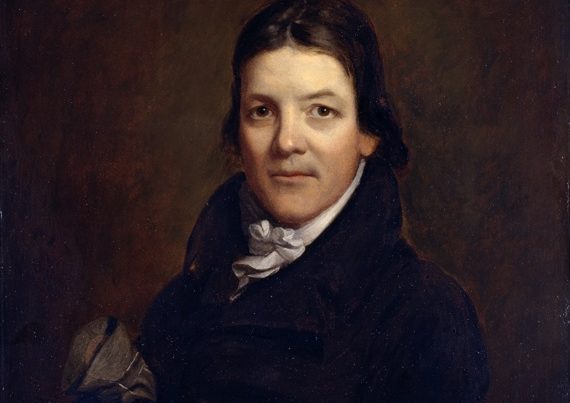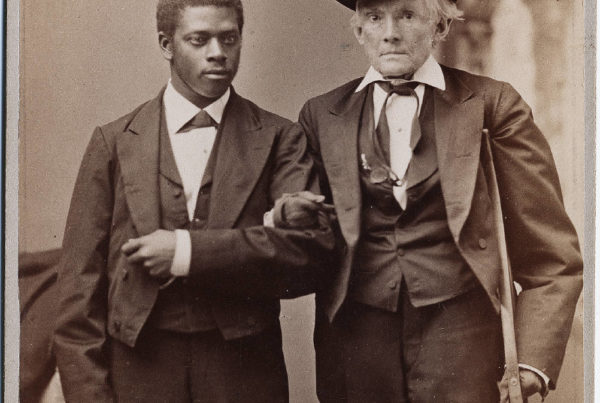When our ever-wise leader set up a program on the American West, he obviously had in mind the geographic west of North America—the Great Plains, mountains, and Pacific coast beyond the Colorado, Red, Arkansas, and Missouri rivers. But when Americans emerged onto the Great Plains in the second third of the 19th century, they were already the inheritors of two centuries of American Westering. The further West was but the last phase of this experience. Permit me in my two talks to deal mostly with that two century prelude, which is where my knowledge and my bent lie.
When settlers moved up the rivers of Tidewater Virginia in the 1600s to hack tobacco plantations out of the forest, that was West. When in the early 1700s Charleston traders sent pack trains overland to Mobile on the Gulf and Natchez on the Mississippi River that was West. When at the time of the American Revolution Daniel Boone gathered a wagon train on the Yadkin River in the middle of North Carolina to lead the first large party of settlers over into Kentucky, that was West.
The Americans who conquered the farther western part of the continent thus had the benefit of a long American experience of conquest of wilderness. But the far West did present problems and opportunities that had not been encountered before. The terrain was much more rugged and uninviting, although it also contained gold, silver, copper, and other valuable things. And there was soon the railroad to conquer the great distances.
Another new obstacle was the Plains Indians, who unlike the natives encountered earlier, were among the most effective mounted bandits, or if you prefer, light cavalry, in the world. They had mastered the horse, left behind by wandering Spaniards, and created a fierce nomadic culture. The Comanche and Kiowa thought little of a thousand mile ride from the high plains into Mexico, stealing horses, women, and anything else portable, and disappearing before the victims knew what had hit them. Which is well described in Fehrenbach’s great book on the history of Texas. Indeed, a primary reason that the Spanish and later Mexican authorities encouraged Americans to take up lands in Texas was to provide a buffer between themselves and the Indians. So the Texas Rangers were born, who could mount up on short notice and catch up with the raiders before they disappeared. And a Texas Ranger went to an arms manufacturer in Connecticut with an idea, from which resulted the Colt revolver which did not have to be reloaded after every shot and was easy to handle on horseback. Over many decades the Texas Rangers were effective at a job that the U.S. Army never mastered. Which is why the U.S. Army transferred its ruthless war against Southerners into an even more ruthless campaign to exterminate Indian women and children.
The most important new challenge of the Plains, however, remains to this day. Past the 100th meridian, as well described in Walter Prescott Webb’s The Great Plains, the average annual rainfall drops off sharply. Western Europe and eastern America were well-watered and well-wooded lands The Plains were relatively an arid land and towards the south desert. In fact, on maps and in common lore, the interior was for a long time “The Great American Desert,” a poor prospect for settlement.
This condition required many innovations. Much more land was needed for a sustainable family homestead. Water became, and still is, a vital issue. Stock-raising moved from the Southern upcountry (where it had come from the British Border lands) onto the Plains where it flourished on a huge scale, requiring the windmill to bring up water from under the earth. Rather than keeping the stock in, in immemorial fashion, it was necessary to keep the stock out—thus barbed wire.
The story of Westward expansion used to be a staple of American history. Westward Expansion was the title of the Ray Billington textbook that Professor Magrath wrote about in Chronicles a few issues back. It portrayed a large part of the American story as three centuries of a mobile frontier beginning outside the palisades of Jamestown. This kind of history has just about disappeared from college curricula. Because academic American history is mainly dominated today by boys from the Bronx and Brooklyn for whom American history begins when their folks arrived at Ellis Island and everything before that, being merely Anglo-America, is either evil or insignificant.
For a long time a central interpretive idea of American history, as proclaimed by Frederick Jackson Turner, was the concept of the frontier, though you will seldom hear it any more. Turner noticed that in the census of 1890, for the first time ever, no definite line of settlement could be observed. The moving frontier, the constant adaptation to new lands, which had been perhaps the most formative part of the American experience, no longer existed. There was something of a fin de siecle pessimism in Turner, a hint that things would now take a turn for the worse, that our fate was inevitably to come to resemble the Old World and lose what was uniquely American.
The Turner thesis suggested that many of the most characteristic American traits were products of the frontier, which had required Americans who were coping with a wilderness to shake off European ideas of social hierarchy and professional credentials. Americans had thus become a pragmatic people and an egalitarian people, a people who were always starting from scratch and who asked not who you were but what you could do. The frontier was thus the catalyst of democracy.
It seems to me that the Turner thesis that the frontier, properly understood, was a dominant factor in the formation of American character still retains a great deal of validity. If we admit that America is not an abstract invention, but a progeny of Europe, then we still have to explain those things in which America has diverged from Europe. What made the differences? The frontier, whatever quibbles may be made about it in detail, seems to be a concept that explains that. It certainly works better as an explanation of American history, at least until recently, than the ideology of the “Poposition Nation” or “Universal Nation” that now seems dominant. That was invented in the early 20th century by people who wanted to denationalise the American population.
In Turner’s time it was normal to consider the American westward movement as a phase of the dynamic expansion of European man across the planet, which had begun on the Asian steppes and had been going on for centuries. This was considered an admirable thing and had not yet been identified as history’s greatest evil. Turner’s time was also much under the influence of geographical determinism. Thus he attributed Americanisation to the necessity of adaptation to new geographic conditions. He grew up on a farm in Wisconsin and much of what he saw as the new American character was reflected around him in the customs and attitudes of Midwestern people. Nonetheless, his frontier thesis led him to another thesis which is even less known today—his sectional thesis. The frontier accounted not only for the differences between Europeans and Americans but also for the differences among Americans. Obviously settlement of the Gulf States and settlement of the Great Lakes States required dissimilar adaptations and produced differing cultures and economies. Thus federal politiucs became a struggle of sections.
So far so good. There were some things, however, that Turner failed to take into account. He did not understand that the Europeans who created America were not of a piece. They brought with them significant cultural differences from the mother country, as has been described by David Hackett Fischer in his seminal Albion’s Seed: Four British Folkways in America. Thus the differences between Americans, which brought on the bloodiest war of the 19th century, may not have been so much a product of geography and economics as a product of different origins in the Old World.
The frontier thesis, with its emphasis on adaptation to new conditions, also gave insufficient weight to cultural continuity. It is a fact almost never noted by Americans, who adore change, that settlers, colonists, who leave the mother country often retain old characteristics that have disappeared in the homeland. Culturally, they are not innovators but conservatives. Thus Southerners have continued to speak with an English much closer to that spoken by Elizabeth I and Shakespeare than that spoken by Elizabeth II and Anthony Hopkins. Thus the Reformation has remained potent in America when it has disappeared from the Old World. Thus the James brothers on the Missouri frontier were influenced by a code of chivalry that had already been replaced in Britain and the U.S. North by the profit-maximising conduct of how to win friends and influence people.
It is also true that the two most powerful and most conflicted aspects of Americanism came from England and fought a gigantic battle in the New World—the Puritan determination to create a righteous and dominant City Upon a Hill, and the Southern quest for a New Eden where poor men and younger sons could acquire land and become independent. Colonists leave the Mother Country for new opportunities but they do not usually want to create a new world. Rather they want to recreate what they most value from the old—they are therefore people of conservative instincts despite their tangible exile. This is equally true of the westward movement. It is a fact that people moving west tended to prefer to settle in new places that were as similar as possible to those they had left behind and to re-create the communities they had left.
There are some other important aspect of the westering experience that we ought to recognise if we are to understand it fully. These are things that have dropped from consciousness because of a change in America and in the sources of the American population.
The settlement of the colonies from Europe and the movement of Americans westward was almost entirely private enterprise. The people brought from Britain their religion, customs, and laws, but they were not clients of government. They paid their own way and made their own way. They risked their own lives and expended their own capital and labour to bring new settlements into existence in a densely wooded wilderness inhabited by dangerous savages. This reality goes far to explain the American War of Independence. The colonists regarded themselves as free men who had built their own world. When they saw that the British government was beginning to treat them as factors in imperial administration, they reacted. The celebrated observer Alexis de Tocqueville wrote that the American was an Englishman who had been left to himself. Had he said British rather than English he would have scored a bullseye.
Government had little to do with the conquest of the frontier nor did the national armies of either Britain or the U.S. have a central role. When Andrew Jackson defeated the British invaders at New Orleans he held the commission of general commanding the Southern Military District of the U.S. But the men who won the battle were not government soldiers. They were volunteers from Tennessee, Kentucky, and Mississippi. I am perpetually irritated by present-day militarists who talk of the Alamo as if it were some kind of exhibit of the prowess and devotion of the U.S. Army. Every man there was a volunteer who had left the United States behind. While they were dying for liberty John Quincy Adams of Massachusetts rose in the House of Representatives in Washington and denounced them as pirates and gangsters who were oppressing the poor Mexicans as part of a Southern conspiracy to spread slavery. Until the time of Lincoln, Indian-fighting was a private and community endeavour and not a government program.
There is no need to feel too guilty about oppressing the poor Indians and stealing their land. The Indians before and after the white man came were unceasingly at war among themselves and they had little concept of land ownership. Their sparse and scattered populations had not begun to tap the potential of North America for human good. Until late in the game, most Indian fighting was private and local enterprise and many white men, women, and children made the ultimate sacrifice. Only in the last phase of settlement did the U.S. government turn its mighty military machine from suppressing Southerners to suppressing Indians—not because the Indians were killing white men, women, and children but because they were retarding railroads, mines, and other sources of corporate profits. Not all attitudes toward the natives were the same. Southerners tended to grant them a certain nobility and even in some cases intermarry with them, while Yankees regarded them as vermin to be exterminated.
You know, I do not feel at all guilty about all that land that we evil Anglo-Americans stole from Mexico. Mexicans had had the land for some centuries and had not settled it enough to raise a good soccer team. When California was taken there were already more white men from the U.S. and Europe there than there had ever been Mexicans and such Mexicans as were there had little contact with or affection for Mexico City. And the Mexico that the U.S. went to war against in 1846 had a large and aggressive army led by a dictator who fancied himself a Napoleon and had made and in some cases carried out blood-curdling threats against the gringos. Indeed, then as now, Mexican national identity depended heavily on hatred of the people beyond the Rio del Norte.
Daniel Boone did not go over the mountains as a representative or even with the permission of the Crown. He was, in fact, acting in defiance of imperial policy. Later when the U.S. government was selling off land in the West, it found that the people were there and already de facto owners before the government surveyors arrived. So the Congress had to repeatedly pass pre-emption laws that allowed first settlers easy title to the land they had already taken.
SOURCE: From The Rockford Institute 2009 Summer School on “The American West.”







